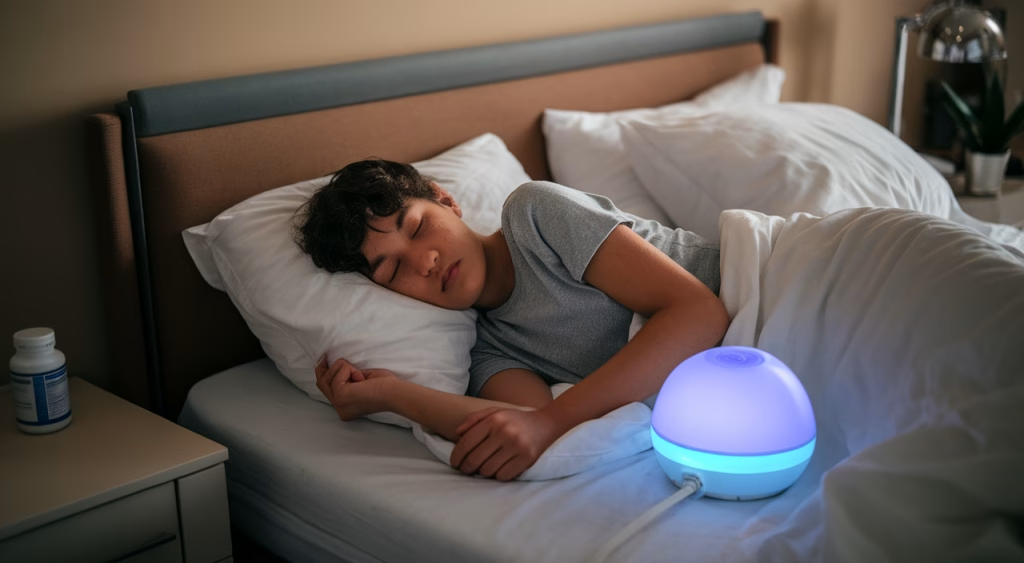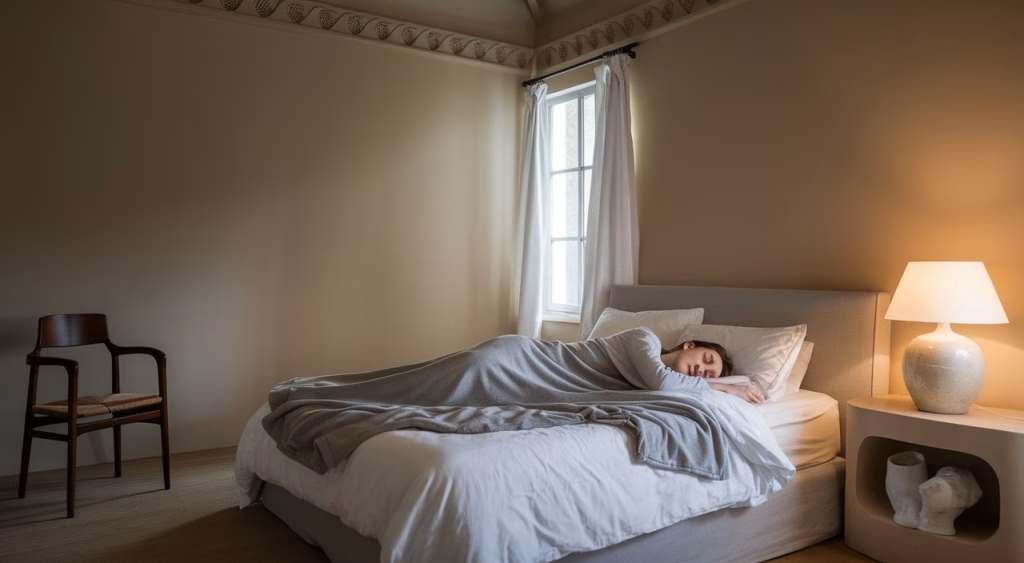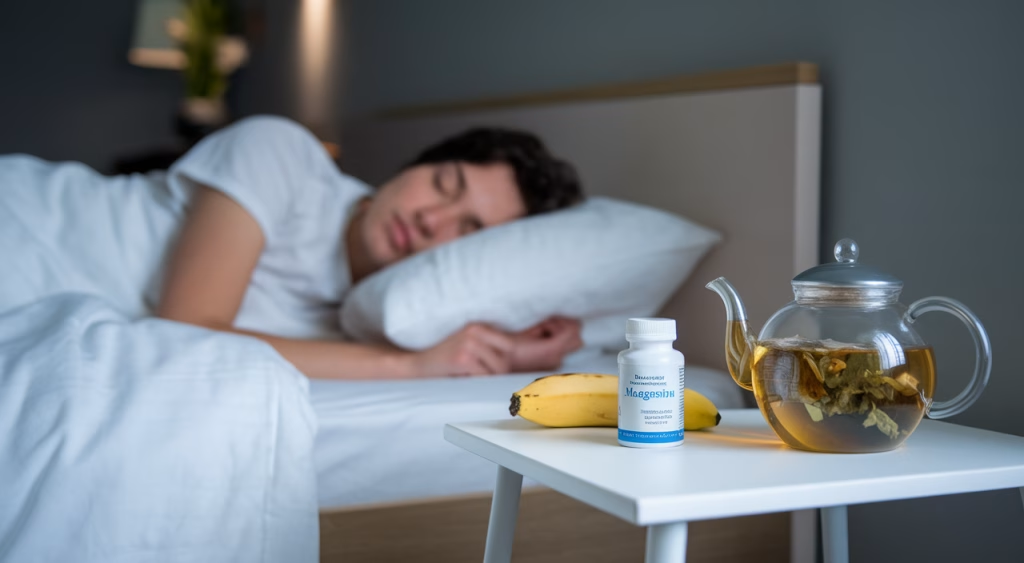Can Certain Medications Really Cause Snoring?
Yes, they absolutely can. Medications that cause snoring—especially those affecting your central nervous system, muscle tone, or nasal passages—can significantly contribute to or worsen nighttime breathing disruption. This happens because these drugs may relax throat muscles, dry out airways, or alter breathing rhythms, all of which create the perfect storm for medication-induced snoring.
TL;DR Summary
- Snoring can be a side effect of certain medications, particularly sedatives, muscle relaxants, and antihistamines.
- Common culprits include benzodiazepines, opioids, beta-blockers, and allergy medicine.
- Medication-induced snoring remedies include modifying your sleep position, using humidifiers, and discussing medication alternatives with your doctor.
- Expert tips can help you balance effective treatment with healthy sleep.
- You can learn how to stop medication-related snoring without giving up necessary medications completely.
Understanding Medication-Induced Snoring
Snoring isn’t just a nighttime nuisance; for many, it’s a disruptive health concern that affects quality of life. When you trace the timing—the snoring started after beginning a new prescription—it becomes clear there might be more than coincidence involved. This type of snoring has a specific name: medication-induced snoring.
Here’s how medications that cause snoring work against you. These drugs can affect your sleep by relaxing throat muscles, thickening mucus, or changing how deeply you sleep. This obstruction leads to irregular airflow and creates the all-too familiar vibrations that signal snoring. The result? Disturbed rest for you and anyone within earshot.
How Medications Can Impact Your Sleep
Imagine trying to sleep as your body slowly loses control over the muscles that keep your airway open. That’s essentially what happens with many medications that cause snoring. Let’s break down these best ways to manage snoring from medication by first understanding the problem.
Muscle Relaxation and Airway Collapse
Drugs like benzodiazepines and opioids work by relaxing muscles—including those in your throat. This muscle relaxation increases the likelihood of partial upper airway obstruction, especially during deep sleep stages, making medication-induced snoring more likely.
Nasal Congestion and Dryness
Antihistamines and decongestants may relieve allergy symptoms but at the cost of drying your airway. This thickened mucus and reduced moisture create perfect conditions for turbulence and snoring—key factors you’ll need to address when learning how to stop medication-related snoring.
Sleep Cycle Disruption
Some medications interfere with REM sleep or other sleep phases, leading to poor-quality rest. With less restorative sleep comes a higher likelihood of irregular breathing and, you guessed it—medication-induced snoring.
Identifying Medications That Cause Snoring
Now let’s unpack the most common classes of medications that are known offenders when it comes to disrupting your peaceful sleep. Below is a quick-reference table summarizing medications that cause snoring, how they affect the body, and what snoring patterns to watch for.
| Medication Type | Common Effect | Snoring Risk |
|---|---|---|
| Sedatives (e.g., benzodiazepines) | Muscle relaxation | High |
| Antihistamines | Drying of airway | Moderate to high |
| Opioids / Painkillers | Respiratory suppression | Very High |
| Beta-blockers | Sleep disturbance | Moderate |
| Muscle Relaxants | Loss of muscle tone | High |
Managing and Preventing Medication-Induced Snoring
Here’s the good news: you’re not helpless against medication-induced snoring. Whether the culprit is a helpful antihistamine or a much-needed muscle relaxant, several proven medication-induced snoring remedies can make a major difference in your sleep quality and help you discover how to stop medication-related snoring effectively.
1. Consult Your Healthcare Provider
Be direct with your doctor: mention your snoring concerns and ask whether your prescription might be contributing to the problem. Sometimes there are gentler alternatives or dosing changes they can recommend—this is often the first step in learning how to stop medication-related snoring.
2. Use a Humidifier
By moisturizing dry nasal passages, you reduce mucus buildup and help free up airflow. A humidifier can be a game-changer—especially when medications that cause snoring also cause airway dryness. This is one of the most effective best ways to manage snoring from medication.
3. Change Sleep Position
Sleeping on your back increases the chance of airway obstruction, particularly with medication-induced snoring. Try side-sleeping or use anti-snore body pillows to reinforce the habit and keep airways open throughout the night.
4. Keep a Sleep Diary
Track when you take medication and when your snoring worsens. Patterns can reveal which specific medications that cause snoring are affecting you most, giving you valuable information to share with your healthcare provider.
5. Stay Hydrated
Simple but effective—water supports thinner mucus and more breathable airways. Proper hydration is essential when dealing with medication-induced snoring, as many drugs contribute to dehydration.
6. Address Weight Gain
Some medications cause weight gain, which can worsen snoring significantly. Consider working with a nutritionist or physical therapist to address any medication-related weight changes that might be contributing to your snoring issues.
7. Explore Non-Medicated Options
For allergies or mild anxiety, you may benefit from non-drug alternatives like nasal irrigation or mindfulness practices, which pose less threat to sleep quality. This approach can help you reduce reliance on medications that cause snoring.
Expert Tips for Better Sleep
From a sleep specialist’s perspective, here are the best ways to manage snoring from medication while maintaining your treatment regimen:
- Take non-drowsy options during the day and allow enough clearance before bedtime for side effects to diminish, reducing medication-induced snoring.
- Elevate your head with a wedge pillow to reduce throat muscle collapse and improve airway positioning.
- Pace your medication timing to fit your sleep schedule best (always under medical supervision) to minimize how medications that cause snoring affect your rest.
Cost Guide: Remedies for Medication-Related Snoring
| Remedy Type | Low-End | Mid-Range | High-End |
|---|---|---|---|
| Humidifier | $20 | $50 | $120 |
| Body Pillow | $25 | $65 | $100+ |
| Nasal Strips | $8 | $15 | $25 |
| Medical Consultation | $30 | $100 | $200+ |
Conclusion: Taking Control of Your Sleep
If medications are helping you live better but disturbing your sleep, the goal isn’t to choose between health and rest—it’s to find balance using proven medication-induced snoring remedies. By identifying medications that cause snoring, speaking with your healthcare provider, and implementing these strategies for how to stop medication-related snoring, you’re well on your way to quieter nights and better days.
Don’t underestimate the value of consistent, restorative sleep. Your well-being depends on it—just like your medications support your daily function, quality sleep supports your recovery and mental alertness. With these best ways to manage snoring from medication, you can maintain your treatment while reclaiming peaceful rest.
With a little awareness and expert-backed medication-induced snoring remedies, medication-induced snoring doesn’t have to dominate your nights anymore. Let’s help you reclaim your rest, one peaceful breath at a time.
Frequently Asked Questions
What medications can cause snoring?
Common medications that cause snoring include sedatives like benzodiazepines, opioids, antihistamines, muscle relaxants, and certain blood pressure drugs such as beta-blockers. These modify muscle tone, airflow, and sleep quality, leading to medication-induced snoring.
Can I stop snoring without stopping my medication?
Yes, you can learn how to stop medication-related snoring while continuing necessary treatments. These medication-induced snoring remedies include adjusting medication timing, using humidifiers, improving sleep posture, and working closely with your doctor to find the best ways to manage snoring from medication.
Is medication-induced snoring dangerous?
While snoring itself is often harmless, medication-induced snoring may indicate reduced breathing quality and potential sleep disruption. It can signal the need for medical review, especially if accompanied by fatigue or sleep apnea symptoms.
Some medication-induced snoring remedies, like positional changes or humidifiers, may improve your condition within days. Others, such as medication adjustments for how to stop medication-related snoring, require consultation and may take weeks to show noticeable effects.
Should I stop a medication if I notice snoring?
No—never stop a prescribed medication without medical advice, even if you suspect it’s one of the medications that cause snoring. Instead, inform your healthcare provider who can evaluate alternatives or supportive strategies using the best ways to manage snoring from medication.





